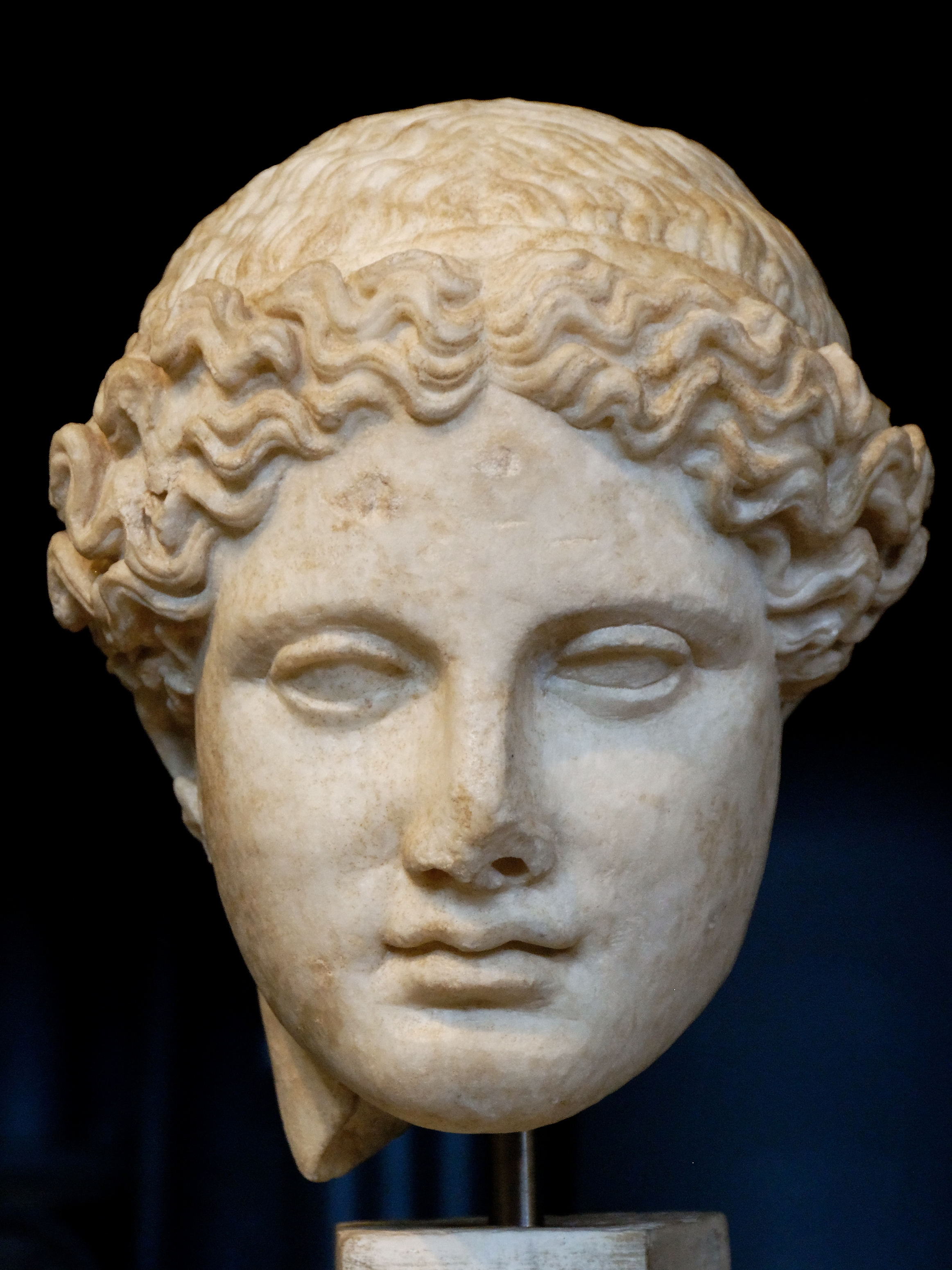List of figures in Greek mythology. Jump to navigation Jump to search. Assembly of 20 Greek gods, mostly In some descriptions, she gave up her seat as one of the Twelve Olympians to Dionysus, and she plays a minor role in Greek myths. The Roman version of Hestia, however, Vesta, was a major goddess in Roman culture. links to materials on Greek, Roman and Christian history and civilization Greeks were more fond of casting Bronze sculptures, actually most marble sculptures remaining today are Roman, or Roman copies from Greek originals. Other materials such as ivory, gold and wood were widely used by the Greeks. While classical Greek The Greek gods have a Roman aspect in which their personalities and sometimes attributes change. These personas are still honored in modern times at Camp Jupiter. This camp normally uses their Roman names instead of their Greek ones. In their Roman forms they tend to be more disciplined The collections of Greek and Roman Art at the Michael C. Carlos Museum span over four millennia. The earliest, Neolithic pieces are approximately 4000 BC; the latest, Roman, fourthfifth centuries AD. Works in many media are represented, including gold, silver, electrum, bronze, lead, ivory and bone, marbles of many kinds including colored ones, semiprecious stones Mutilations, amputations, dislocation of the joints, restorations; this is the Greek, Roman, and barbarian work of professors according to Vitruvius and Vignole. It was possible that a merciful judge, reserving the flames of hell for the heathenMahommedans. Ancient coin dealer with ancient Greek and Roman coins, Byzantine coins, and other ancient coins in a huge online catalog. Articles, discussion forum and tools for ancient coin collectors. The Greek mythology names of the gods and goddesses varied from the Roman names, although each culture ascribed to deities with comparable powers and spheres of influence. The following table shows those areas and the names of the important deities in each mythology. In GrecoRoman wrestling, the wrestlers use only their arms and upper bodies to attack, and can only hold those same parts of their opponents. As the name suggests, freestyle is a much more open form in which wrestlers also use their legs and may hold opponents above or below the waist. Explore this timeline of some of the most important ancient Greek and Roman philosophers from the 7th century BCE to the 4th century CE. Helvetica's RIC lists, Dozens of xls lists compiled by Dane to precisely identify your Roman (and some Greek and Provincial) coins. Practise first using the short how to pdf. (Some additional lists are in a password protected area) WildWinds Ltd. and the WildWinds logo are trademarks. The Greek and Roman guide provides a short glossary of terms relating to the gods, goddesses, people, places and events that feature in Roman and Greek myths and legends. A fast, ataglance list of short definitions in alphabetical order are provided in this Greek and Roman gods and mythology guide. Roman religion, also called Roman mythology, beliefs and practices of the inhabitants of the Italian peninsula from ancient times until the ascendancy of Christianity in the 4th century ad. Roman mythology, like that of the Greeks, contained a number of gods and goddesses, and because of the early influence of Greece on the Italian peninsula and the everpresent contact with Greek culture, the Romans adopted not only their stories but also many of their gods, renaming a number of them. This page is a list of the names of Roman gods in ancient mythology and their roles. It will be continually updated with additions, corrections and more information on each of the gods. Greek and Roman mythology often have the same Gods but with different names because many Roman Gods are borrowed from Greek mythology, often with different traits. Greek and Roman Mythology from University of Pennsylvania. Myths are traditional stories that have endured over a long time. Some of them have to do with events of great importance, such as the founding of a nation. Kids Definition of Roman (Entry 1 of 2) 1: a person born or living in Rome. 2: a citizen of an ancient empire centered on Rome. 3 not capitalized: upright letters or type. Kids Definition of Roman (Entry 2 of 2) 1: of or relating to Rome or the Romans. Roman mythology is the structure, body and also the study of ancient Rome's legendary and mythological origins, practices, beliefs and religions until Christianity replaced the native religions of. The Roman authors adopted the mischievous god from the Hellenistic Eros, instead of the earlier Greek authors, who see Eros as a more primal or primordial being. Greek Coinage Ancient Greek coinage can be divided into three periods that generally conform to the traditional periods of Greek art. The earliest period, the Archaic, covers the time from the introduction of coinage in Asia Minor sometime in the seventh century BC. Roman art imitated Greek art in many ways because the Romans learned about painting and sculpting from the Greeks, during the time when Rome conquered Greece. Roman copies of Greek art are sometimes mistaken for being Greek in origin. Greek Coins by Sear GCV Number Greek Roman Provincial Coins by Moushmov Number Greek Roman Provincial Coins by City, Region or Ruler. Byzantine Coins by Sear BCV Number Byzantine Coins by Ruler. The WildWinds website has been created as a reference and attribution resource in the field of ancient numismatics. Greek And Roman Religion The Worship Of The Dead. When we think of Greek and Roman religion or the classical world generally, we usually have in mind the kingdoms and empires that grew out of the citystates of ancient Greece and Italy. Hermes Hermes bearing a caduceus, Roman copy, c. 1st century ce, of a Greek sculpture, c. 350 bce; in the British Museum. Courtesy of the trustees of the British Museum Like many gods in the Greek pantheon, Hermes presided over multiple spheres. Greek and Roman Mythology Most of the Greek deities were adopted by the Romans, although in many cases there was a change of name. In the list below, information is given under the Greek name; the name in parentheses is the Roman equivalent. Although Greek Gods are arguably better known, Greek and Roman mythology often have the same Gods with different names because many Roman Gods are borrowed from Greek mythology, often with different traits. For example, Cupid is the Roman god of love and Eros is the Greek god of love. Ares is the unpopular and feared Greek god of war and his Roman counterpart is Mars who is the revered. The Museum's collection of Greek and Roman art comprises more than 17, 000 works ranging in date from the Neolithic period (ca. ) to the time of the Roman emperor Constantine's conversion to Christianity in A. Greek culture and society came into fruition roughly 1250 years before the rise of the Roman Empire and Roman artisans were strongly inuenced by their Greek predecessors. However, the Greeks were not without their own inuences. Classical Myth: The Ancient Sources: This site draws together the ancient texts and images available on the Web concerning the major figures of Greek and Roman mythology. Although concentrating primarily on ancienct sources and illustrations, some Renaissance images have been included. Decline and Fall of the Roman Empire by Edward Gibbon [ The majestic history of the downfall of Rome, unabridged. Bulfinch's Mythology by Thomas Bulfinch [1855 Bulfinch's able retelling of the classic myths has served as an introduction to the subject for generation of readers. The best online coin shop to buy AUTHENTIC numismatic ancient Greek, Roman, Biblical, Byzantine, Medieval Historical Coins and Artifacts. Enjoy the videos and music you love, upload original content, and share it all with friends, family, and the world on YouTube. Find this Pin and more on Sculpture greekroman by Lex Hamers. The Acropolis Museum is an archaeological sitespecific museum, housing more than famous artefacts from the Athenian Acropolis, the most significant. The Greek myths, as we know them, came from all over the ancient Balkan Peninsula: Thrace, Boeotia, Attica, the Peloponnesus, Argos, and Mycenae, and many of the islands, including, of course, Crete, and also from Asia Minor The acceptance of Greek gods had the biggest influence on Roman religion. The earliest Greek gods adopted by the Romans were Castor and Polydeuces in 484 BC. Later in the 5th century BC, the Greek god Apollo was introduced. Greek and Roman Art and Architecture About The art and architecture of ancient Greece and Rome played a foundational role of the history of Western art, establishing numerous key concepts, techniques, and styles that artists in the subsequent millennia have revisited and. Here are the twelve Olympian gods and a brief description of each. The Greeks and Romans shared the same stories, but used different names. A list of the Greek gods and their equivalent names in Roman mythology Roman names for Greek gods The following is a list of the Greek gods that are represented in Roman mythology, along with their names in Roman myths. Greek and Roman Gods Most of the Greek Gods and Goddesses were adopted by the ancient Romans, although in most cases there was a change of name. In the table below is a list of the Greek Gods and Heroes and their Roman equivalents. Find great deals on eBay for Greek Roman Statue in Sculpture and Carvings from Dealers and Resellers. The Roman or Latin alphabet is the alphabet used to write many modernday languages. It is the most used alphabet and writing system in the world today. Some Roman Gods do not even have a Greek aspect, being born within the Roman religion which, such as Terminus, the original pure Roman God. Mithras is an instance that Roman mythology interacted and fused with other religions with the expansion of the empire. Roman Greek Costumes from antiquity like Caesar, Roman senator, Spartan warrior, Gladiators, Athena Greek Goddess and toga costumes! Check out our Collection: you can shop for Greek Costumes, Roman Costumes, and 300 Costumes at Oya Costumes Canada. The Greek and Roman Influence over Modern America 1431 Words 6 Pages. The Greek and Roman Influence over Modern America The Greeks and the Romans were among the most influential societies in the history of the world. Roman mythology is the body of traditional stories pertaining to ancient Rome's legendary origins and religious system, as represented in the literature and visual arts of the Romans. Roman mythology may also refer to the modern study of these representations, and to the subject matter as represented in the literature and art of other. The correspondence between the Greek and Roman gods is closer than that of, say, the Romans and the Britons, because the Romans adopted many of the myths of the Greeks, but there are cases where Roman and Greek versions are only approximations. The study of literature in Greek and Latin lies at the center of all the fields covered by the Department of Classics. The differences are in how each field construes textual evidence and defines the parameters of the literary. Watch videoGreek mythology does not just tell the stories of gods and goddesses, however. Hercules (known in Greek as Heracles or Herakles) is one of the bestknown heroes in Greek and Roman mythology..











